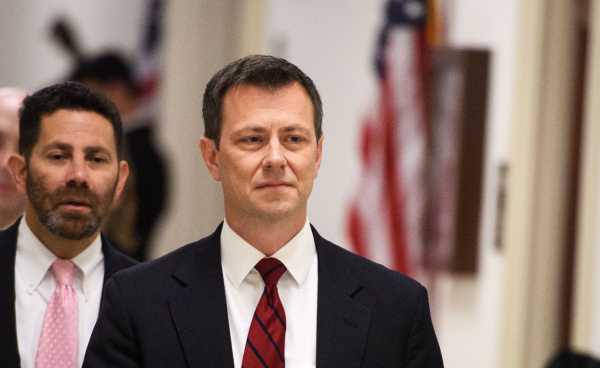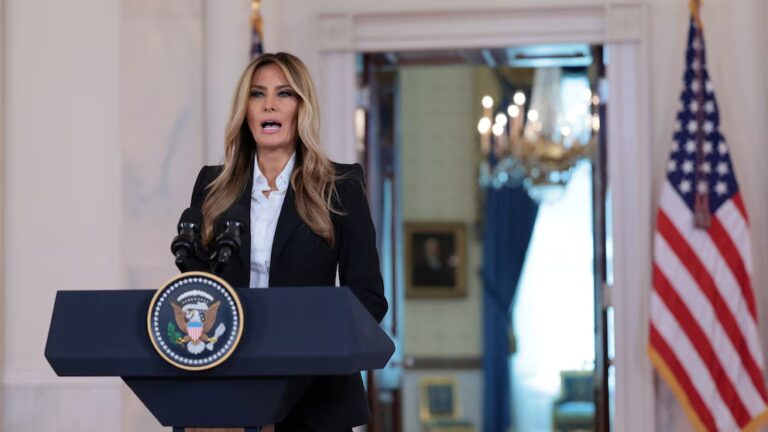
Peter Strzok, the FBI agent whose anti-Trump text messages raised concerns that the Mueller investigation was tainted by political bias, will testify before Congress on Thursday.
It has the potential to be an explosive hearing.
A veteran counterintelligence agent, Strzok was directly involved in the probe into Hillary Clinton’s use of a private email server in 2016, and special counsel Robert Mueller’s investigation into whether the Trump campaign colluded with Russia to win the 2016 presidential election.
In the summer of 2017 the Justice Department found that Strzok had sent text messages critical of Trump to FBI attorney Lisa Page in the run-up to the 2016 presidential election. Mueller removed Strzok from his investigation after learning the information that summer.
But when some of Strzok’s texts were released to the public in December, many conservatives interpreted his cryptic messages to Page as evidence that he was plotting to interfere with the presidential election. One of his text messages in particular, which mentioned having an “insurance policy” against Trump winning, aroused suspicion among his critics.
But in June, the Justice Department’s inspector general released a report that found there was no evidence that Strzok acted on the anti-Trump sentiment he expressed to Page while working on the Trump-Russia probe, and the investigation into Hillary Clinton’s private email server.
“Our review did not find documentary or testimonial evidence directly connecting the political views these employees expressed in their text messages and instant messages to the investigative decisions we reviewed,” the IG report states.
However, the new report also brought to light more texts from Strzok to Page, the most controversial one of which said, “We’ll stop it,” when referring to the prospect of Trump winning the election. Republicans and right-wing pundits claimed it confirmed that the FBI was on a political witch hunt to take down the president.
Strzok’s lawyer has said that the agent will get a chance to clear his name at the hearing on Thursday. But Republicans are going to hammer Strzok over his text messages, and try to glean some sort of admission of wrongdoing.
Simply put, the stakes are huge. If Strzok ends up managing the appearance well, he could potentially put a dent in conspiracy theories about FBI corruption. But if the hearing goes poorly, it will do political damage to the credibility of the Mueller probe, and Mueller’s ability to investigate the full extent of Trumpworld’s relationship with Russia.
Strzok is an influential player in the FBI who clearly didn’t like Trump
Back in December, the New York Times reported that Mueller had dismissed Strzok from his investigative team last summer because the agent had sent dozens of text messages critical of Donald Trump to a colleague during the 2016 election season. The texts showed he resented Trump and, among other things, referred to then-candidate Trump as a “douche,” an “utter idiot,” and a “loathsome human.”
Most damningly from the Republican point of view, Strzok once referred to an “insurance policy” against Trump winning. “I want to believe the path you threw out for consideration in Andy’s office — that there’s no way he gets elected — but I’m afraid we can’t take that risk,” he told Page. “It’s like an insurance policy in the unlikely event you die before you’re 40.”
It’s unclear if he violated any FBI rules, but Mueller removed Strzok to ensure the investigation was free from accusations of partisan bias, according to the Times.
A few days later, CNN reported that Strzok, who also led the FBI’s investigation of Hillary Clinton’s private email server, changed the wording in a description of Clinton’s behavior from “grossly negligent” to “extremely careless” in a draft of a major public statement that then-FBI Director James Comey made in July 2016. That change had the effect of softening Comey’s criticism of Clinton at a particularly sensitive time in the 2016 campaign, and may have made her less vulnerable to criminal charges.
Trump and conservative media figures seized on Mueller’s dismissal of Strzok from the Russia investigation and painted it as a shady maneuver intended to cover up partisan bias. And Strzok’s role in softening the language on Clinton’s misconduct, in addition to his text messages — which the FBI lost track of at one point due to a technical glitch — were interpreted by Republicans as a sign that Strzok was conspiring to tip the election in favor of Clinton.
In January, new reports showed that Strzok’s role in the Clinton investigation was not as pro-Clinton as it originally looked. CNN obtained emails that showed that Strzok co-wrote the first draft of the letter that then-FBI Director James Comey sent to Congress in October 2016, announcing that the bureau was reopening an investigation into Hillary Clinton’s emails. That letter set off a political firestorm just 11 days before the presidential election and hurt Clinton at the polls — so much so that it may have swung the election in favor of Trump.
The texts are shady and inappropriate. That doesn’t make them evidence of biased action.
Ultimately, what has dogged Strzok the most is his text messages to Page. And the June IG report’s revelation about the “We’ll stop it” text has made things even worse.
It’s not clear exactly what Strzok meant. Was the “we” in “we’ll stop it” the FBI, or is it something vaguer (i.e., “we the people” will “stop” Trump by voting for Clinton)? It’s hard to say, but the former reading is certainly plausible. And if that’s correct, then it could easily be seen as a promise to take action to thwart the Trump campaign.
But while it’s inappropriate for someone in Strzok’s position to express favoritism toward a certain presidential candidate, there isn’t clear evidence he acted on those views.
The IG report’s investigators looked into Strzok and Page’s conduct, and examined internal FBI records of the meetings concerning Trump that the two were involved in. Here are their key conclusions:
It’s possible that Strzok never intended to act on his words, or that more professional FBI employees prevented him from acting in a politically motivated fashion. Regardless, the text messages are a personal indictment of Strzok — but that doesn’t mean the entire Russia probe has lost its legitimacy.
Thursday’s hearing is unlikely to provide clarity or consensus
When Strzok testifies before lawmakers on Thursday, Democrats are hoping that Strzok is able to provide answers that clear up some of the controversy around his past conduct. Republicans, on the other hand, will likely hope to corner him or try to depict him as a symbol of the corruption of the FBI in the Trump era.
After a nearly 10-hour closed-door interview with lawmakers two weeks ago, Republican lawmakers reportedly found Strzok’s answers to be damning for the FBI, while Democrats seemed to think that his misdeeds were being blown out of proportion. GOP Rep. Andy Biggs (AZ) described himself as “mad and angry” after the meeting; Democratic Rep. Jamie Raskin (MD) said the whole thing was a “monumental waste of time.”
Whatever Strzok says on Thursday, chances are that divide will remain.
Zack Beauchamp contributed reporting to this article.
Sourse: vox.com






